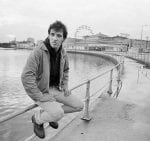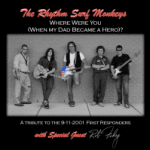Labor Day Special: What Motivates Us to Work? For Bruce and Me, It’s ‘Abandonment of the Self’
At a show at New York’s legendary Apollo Theater a few months back, Bruce Springsteen joked that he was the “hardest working white man in show business.” Bruce made this remark in homage to one of his idols, the late James Brown, the soul-funk sensation long known as the “hardest working man” in the business. James, the Apollo apostle, often performed up to 330 one-night shows per year, in extravagant bop-till-you-drop style.
Growing up in extreme poverty may have driven James Brown to work till exhaustion, but what inspired a middle-class white boy from Long Branch, New Jersey, to rock his heart out onstage for four hours, night after night, from beach bars to coliseums? His love of his fans is one easy answer. But it goes much deeper than that, as I was reminded after reading a fascinating profile of Bruce in the July 2012 issue of The New Yorker magazine.
Like many artists with complicated backgrounds, Bruce has had his share of alienation, self-doubt and can’t-please-Daddy issues. He is quoted in The New Yorker article as saying that his tireless on-stage energy was often driven by “pure fear and self-loathing and self-hatred.” Yes, folks, one of the most famous and talented men on the planet has looked deep within himself and wondered: What does it all mean? What do I do next? In a remarkable display of self-honesty, he told writer David Remnick:
“My issues weren’t as obvious as drugs. Mine were different, they were quieter—just as problematic, but quieter. With all artists, because of the undertow of history and self-loathing, there is a tremendous push toward self-obliteration that occurs onstage. It’s both things: there’s a tremendous finding of the self while also an abandonment of the self at the same time. You are free of yourself for those hours; all the voices in your head are gone. Just gone. There’s no room for them. There’s one voice, the voice you’re speaking in.”
Bruce literally wore himself out on stage. Because for those three or four hours he could use rock and roll as a great escape, and take the audience along as he went “riding out to case the promised land.”
Years ago when I first heard Bruce’s song, “Somewhere in the Night,” I latched onto a particular lyric: “Turn the radio up loud, so I don’t have to think.” It’s always been that way for me. Turn it up loud and let me rock the reality out of my head for a while. Like Bruce, I understand the therapeutic value of burying myself in work. I write a blog that is followed by a few loyal friends and music fans. I don’t do this for money or fame. I don’t consider it a hobby; I think of it as my work. I write about the things that feed my soul, and if I happen to enlighten someone along the way, it warms my heart. But, much of it boils down to “brain occupation.” Like Bruce, I bury myself in my rock-n-roll work to stay free of the bondage of self. No chemical substance on earth can chase away the demons like listening to rock-n-roll and spreading its gospel.

I have a long history with Bruce Springsteen. Back when I discovered him in 1975, he was still singing about boy-prophets and teenage diplomats, Tilt-a-Whirls and transistor radios, Southside sisters and subway sages, cool Romeos and late Juliets who sat on fire escapes and skipped school. I liked that Bruce the best, because those songs were about romantic escapism. Later, when he started singing sad ballads about desperate people with dead-end lives, it was more reality than I could handle.
But whether I dig the sad songs or not, I salute Bruce for his ability to pen lyrics that have the power to move anyone: from ditch-digger to corporate honcho, from left wing liberal to staunch conservative. Whether you sit behind a desk or stand behind a jack-hammer, is there anyone who has not related to this lyric from “The Promised Land” at one time or another in their working lives?
I’ve done my best to live the right way,
I get up every morning and go to work each day.
But your eyes go blind and your blood runs cold,
Sometimes I feel so weak I just wanna explode.
Bruce is a true original. And whether or not I embrace every one of his albums is a moot point. Because, like all real artists, he does what he needs to do to stay true to his soul. No one could say it better than this:
“I’m thirty years in analysis! Look, you cannot underestimate the fine power of self-loathing in all of this. You think, I don’t like anything I’m seeing, I don’t like anything I’m doing, but I need to change myself, I need to transform myself. I do not know a single artist who does not run on that fuel. If you are extremely pleased with yourself, nobody would be fucking doing it! Brando would not have acted. Dylan wouldn’t have written ‘Like a Rolling Stone.’ James Brown wouldn’t have gone ‘Unh!’ He wouldn’t have searched that one-beat down that was so hard. That’s a motivation, that element of ‘I need to remake myself, my town, my audience’—the desire for renewal.”
Thanks, Bruce, for inspiring me to work.
Please visit my blog:




